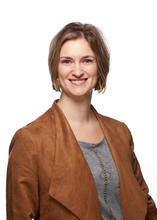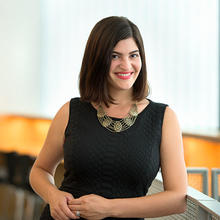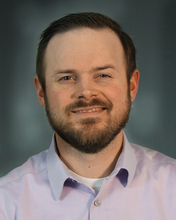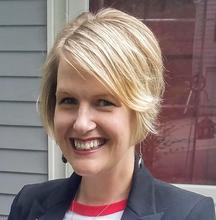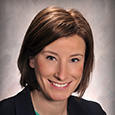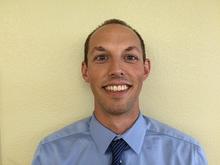Our alumni can't say enough wonderful things about the Professional Master's in Strategic Communication program. Ninety percent say the program helped them become better professionals. Ninety percent also say the program helped them see an increase in their income. But don't just take our word for it. Hear from some of our most successful alumni below.
Jill Giefer
Sr. Director of Brand & Marketing Insights at Best Buy, Co., Inc.
MA Cohort: 4
What made you choose the Professional MA program? I was debating between an MBA and a Master’s in Communications. After doing a ton of research, the Professional MA program seemed like the best fit for me and what I was looking for professionally. I liked the cohort approach and the ability to complete the program within two years.
What was a rewarding part of the program? I made lifelong friendships. There's a group of us that still meet monthly to catch up and now our kids are friends too! The connections have been amazing resources professionally and personally. I also enjoyed taking classes from the talented group of professors who had extensive real-world and academic experiences.
How did the program help you in your career? It introduced me to industry professionals I otherwise might not have met; it gave me confidence to pursue and accept a job change; and it's been a continued source of pride on my resume and bio.
What would I tell people who are interested in the program but are still trying to decide whether to make the leap? Do it! It will unlock opportunities for you, and the support you receive from the cohort and your professors throughout the program will help tremendously. It's a lot of work, but if you enjoy learning, the two years will go by in a flash and you'll be happy you took the leap when you start reaping the benefits of increased confidence, an expanded network and the ability to apply the education to your career.
Susan Garcia Hagen
Assistant Director, University Relations, University of Minnesota
MA Cohort: Cohort 12
What made you choose the Professional MA program? I heard about the program from colleagues of mine, and they were always so invigorated by their coursework and peers, it made me want to learn more. I've been a specialized communicator for many years, but I was interested in developing a more strategic skill set that would allow me to think more critically about the bigger picture. I was also very attracted to the idea of having a dedicated cohort of peers to connect with and learn from.
What was a rewarding part of the program for you? Although the coursework was truly wonderful, the most rewarding part of the program was forging friendships with the other members of my cohort. Not only did I get to learn more about their experiences in a variety of positions and industries, but I continue to benefit from their unique and smart perspectives on challenges and opportunities in my career.
How did the program help you in your career? I've been able to directly apply the things I learned in the program to my current position, including the ability to create a documented social media strategy that helps inform the work we do moving forward. I believe that I'm able to ask smarter, more forward-thinking questions in meetings, and provide a different perspective in the workgroups and initiatives I'm a part of in my role.
What would you tell people who are interested in the program but are still trying to decide whether to make the leap? It's definitely a commitment, so be prepared to work hard, but it's also so very rewarding. If you're unsure about whether to make the leap, reach out to local alumni and ask about our experiences!
Steve Norman
Vice President - Communications & Customer Experience, Western National Insurance Group
MA Cohort: Cohort 5
What made you choose the Professional MA program? When I was originally looking into the program back in early 2009, I was a few years into a career in corporate communications at Western National. The company was growing, and I saw an opportunity to drive the growth of our communications function too, but I recognized that I had a lot of room to grow as a strategic planner. After researching it and looking into other programs, the M.A. program at the University of Minnesota seemed like the best fit to me, based on the combination of its strategy-focused curriculum, cohort approach, and the expert faculty. Having now completed the program, I'm happy to report that it ended up delivering on each one of those differentiating attributes.
What was a rewarding part of the program for you? If I had to narrow it down to just one, I'd say the cohort approach. When I came into the program, my knowledge was fairly limited to corporate communications and my network was limited largely to people in that field or in the insurance industry. The M.A. program here gave me an opportunity to work with and really get to know well about 20 people with diverse backgrounds in public relations, advertising, corporate and public communications, and broadcasting. I know that, eight years after graduating from the program, I could still call up any Cohort 5 classmate of mine to get their input on a problem, and that they feel they could do the same with me.
How did the program help you in your career? I think applying to the University of Minnesota's M.A. program is probably the single best thing I’ve done for my career development. In the time since graduating, I’ve received three promotions, expanded my responsibilities, and been able to apply numerous things I learned in those two years into new programs at my job. For example, the program gave me the tools to pitch and launch an advertising campaign for the first time in over a century of the company’s existence; and to know how to scale our communications appropriately when the company suddenly added five brands in four years.
What would you tell people who are interested in the program but are still trying to decide whether to make the leap? Like many professional grad programs, the University of Minnesota's M.A. in Strategic Communication program is an investment of time, tuition, and energy. However, in my experience -- and I don't think it's a unique one -- this program can also help produce a significant return on that overall investment. Every single class gives you new tools and communication models that you can take and apply the very next day in your career. If you're excited to learn how to think more strategically about communications, and about working closely with talented peer professionals and expert faculty to grow in your knowledge and skill, this could be the right program for you.
Heather Voorhees
Postdoctoral Fellow, Center for Health Communication at the University of Texas at Austin
MA Cohort: 9
What made you choose the Professional MA program? The schedule of classes fit my life, since I had a full-time job when I enrolled, and I liked the structured, two-year path to a degree. The classes are taught by a mix of professors and non-academic experts, which brings a unique real-world perspective into the classroom. The program seems very geared toward a degree that actually helps you in your career, rather than just a piece of paper you hang on the wall to impress people.
What was a rewarding part of the program for you? I really loved the cohort model; going through this experience for two straight years with the same set of individuals was fantastic. We weren't necessarily all best friends, but leaned on each other, celebrated with each other, and stressed out together. Your cohort mates understand the experience better than spouses, parents or friends. I also appreciated the opportunity to take classes in topics I wouldn't have chosen for myself, but came to really love. For example, I now know how to plan a billboard-based advertising campaign.
How did the program help you in your career? The program definitely helped me land a more prestigious, higher-paying job immediately after graduation, which helped me realize that I no longer loved my corporate career path. After about a year in my new job, I knew that this was no longer a good fit for me. I remembered how much I loved going to my M.A. classes two nights a week and how fun it was to dig through academic research, so I decided to go back to school (again). This August, I earned a Ph.D. in interpersonal communication from the University of Nebraska-Lincoln. Throughout my doctoral courses, I found myself consistently referencing things I'd learned during the M.A. program. Because I'd had such a well-rounded program of coursework, I could speak intelligently about topics like organizational communication best practices and marketing tactics.
What would you tell people who are interested in the program but are still trying to decide whether to make the leap? Even if these particular classes or topics don't seem perfectly suited to you right now, you will learn interesting, important, valuable things that will help you in some context, somewhere down the line. This program helps retrain your brain, so that you think about communication differently, and develop new tools to apply to age-old problems.
Jennifer Stoltenow
Post-it Brand Communications Manager at 3M
MA Cohort: 3
What made you choose the Professional MA program? I received my BA from the Hubbard School in 2003, and I knew from my four-year program and how my experience ensured a solid bridge to agency life after graduation that this school has a terrific foundation of faculty, adjunct faculty and resources. After four years of agency life, I explored a number of different Master’s programs in the Twin Cities. When I attended the information session for the Professional MA program, I knew it was the right fit: it consisted of a smaller, cohort-style model, with a mix of working professionals. I knew that in this environment, I could learn a lot from people in the program - and trust and relationships would be built within a two-year commitment. I also believed that the mix of adjunct faculty, full-time faculty and guest speakers would help me improve my strategic thinking and expand my network. The classes offered by the Professional MA program really focused on where I needed to grow - strategic planning, research and insights. I believed that after a two-year commitment, I would be more marketable in both the short and long-term business environment.
What was a rewarding part of the program for you? First was growing in my knowledge and network in the Twin Cities. There were classmates from other agencies, non-profits, government, and corporate environments. The cohort-style felt like a think tank of smart, passionate communication professionals who all wanted to better themselves, and each other.
How did the program help you in your career? I knew that I would ultimately want to make the transition out of agency life into either corporate or non-profit sector. Having the experience at the Professional MA program on my resume was one of the reasons why I was invited to interview for my role at 3M. Having a professional degree in the communications role is pretty rare, and this program allowed me to stand out on paper. The program has given me a much more global perspective on communications and strategy. It also gave me experience working on personas and brand archetypes, among other things.
What would you tell people who are interested in the program but are still trying to decide whether to make the leap? I believe having a growth mindset is critical; if your number one goal in your career is to improve your marketability so YOU are the one driving decisions on your career path, the Professional MA is an excellent choice. You will learn from other professions and have the mental space to step away from day to day tasks to really focus on strategy. The two-year commitment may seem daunting at first, but time passes quickly, and before you know it, you will be amazed that you only have one semester left!
Matt DePoint
External communications specialist, Medtronic
MA Cohort: 9
What made you choose the Professional MA program? A master's degree was always something I wanted to do both professionally and personally. To me, it was a level of achievement and something I'd always have. A coworker of mine was in the cohort ahead of me and she enjoyed her experience.
What was a rewarding part of the program for you? I was able to stretch my thinking beyond what was comfortable and what I knew and learned a lot, not only from my professors/instructors but my fellow cohort members.
How did the program help you in your career? Through the program, Steve, the program director, helped connect me with an alum of the program who was working at my desired company, Medtronic. After that initial networking meeting with the alum, he connected me with a senior director at Medtronic, who later contacted me about an open position on his team. And the rest is history and I'm currently working in corporate issues and crisis management at my destination company. The program certainly helped me get to where I ultimately wanted to be and for that I'm grateful and it was definitely worth it.
What would you tell people who are interested in the program but are still trying to decide whether to make the leap? Figure out what you ultimately want to do with your career. A master's degree of any kind is an investment in time and resources but it's also an investment IN yourself. When comparing resumes, experiences, etc., a master's degree helps you stand out.
